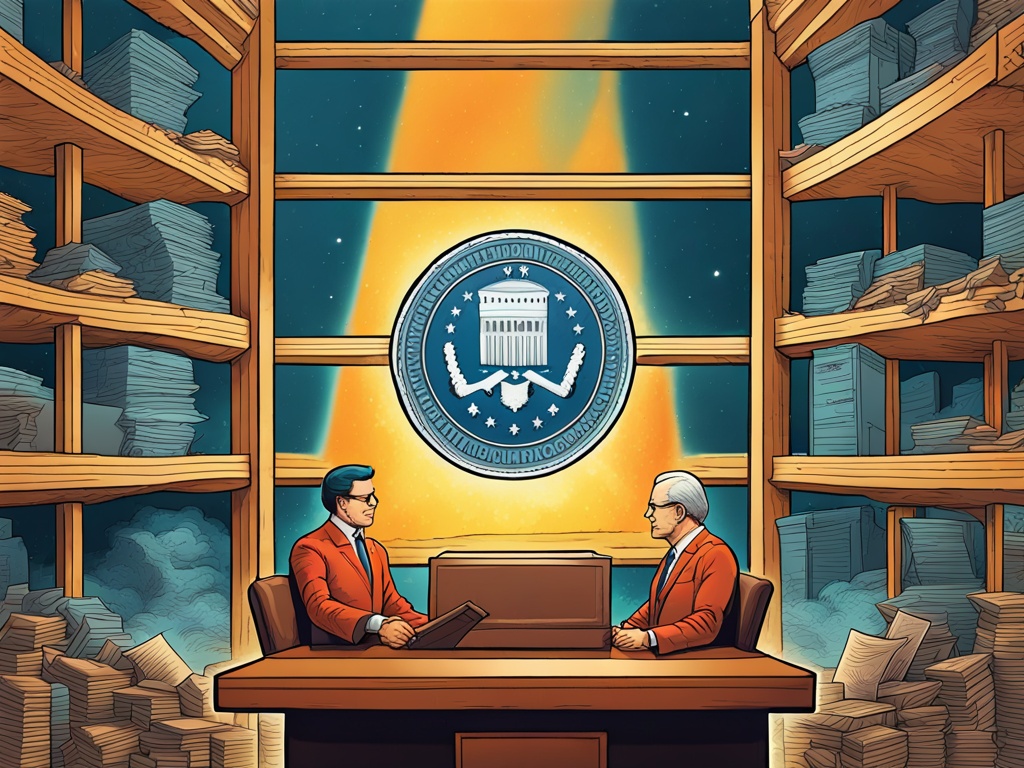Legal Challenges to IRS Regulations Impacting Cryptocurrency Transactions ⚖️
This year, a notable legal battle has emerged in the realm of cryptocurrency as the Blockchain Association, along with the Texas Blockchain Council, has initiated a lawsuit against the U.S. Internal Revenue Service (IRS) regarding its new regulations on digital assets. This action signifies rising tensions between government regulatory bodies and decentralized finance (DeFi) platforms over compliance and operational implications.
The Regulations Under Fire 📜
The recent lawsuit challenges the IRS’s rules that compel those considered brokers to report transactions of digital assets, a requirement slated to begin in 2027. Under these guidelines, brokers are expected to disclose the total proceeds from cryptocurrency sales and provide information about the taxpayers involved in these activities.
Expanded Definition of Brokers 🧐
One significant aspect of the regulations is the broader definition of “broker,” which now includes decentralized exchanges (DEXs) and front-end platforms facilitating these digital transactions. According to Kristin Smith, who leads the Blockchain Association, the lawsuit argues that these IRS regulations contravene the Administrative Procedure Act and have potential constitutional infringements.
She emphasized their commitment to advocating for the future of cryptocurrency and DeFi, focusing on ensuring that this innovative sector continues to thrive in the United States. There is palpable concern among blockchain developers and DeFi advocates regarding the implications of these regulations, which they believe could severely restrict innovation and growth.
Compliance Burdens and Innovation Risks ⚠️
The lawsuit raises critical concerns about the compliance requirements that DeFi platforms face if classified as brokers. These new regulations could impose significant burdens on developers, potentially deterring further innovation within the industry. The Blockchain Association has voiced opposition to what it terms “unlawful compliance burdens,” calling attention to the risks of pushing innovation out of the U.S. market.
There is apprehension in the broader cryptocurrency community that such regulations could negatively impact decentralized finance activities, possibly pushing innovation and development to more favorable regulatory environments outside the United States.
Concerns Over Privacy Violations 🔒
Marisa Coppel, a prominent legal figure within the Blockchain Association, highlighted concerns regarding privacy violations stemming from these IRS requirements. Mandating DeFi platforms to disclose user information could undermine the foundational principle of decentralization, which relies on user anonymity and privacy.
Legal Precedents and Future Implications ⚖️
Notably, legal experts have drawn comparisons with the case of Alex Pertsev, the Tornado Cash developer, who faced substantial legal repercussions for facilitating transactions deemed illicit through non-custodial software. This precedent has amplified worries regarding the potential criminal liability under the new IRS rules for developers operating in the DeFi space.
According to estimates from the IRS, the implications of these regulations could affect between 650 and 875 DeFi brokers and up to 2.6 million U.S. taxpayers. Starting from 2026, brokers will be required to collect transaction data to comply with the reporting obligations effective from the following year.
Potential Responses from the Industry 🚀
In light of the impending regulations, industry analysts are proposing various strategies for DeFi platforms. Alex Thorn from Galaxy Digital suggests that platforms may have to choose among several options: complying with the broker designation, blocking access for U.S. users, or positioning themselves as decentralized applications with minimal interaction and free of transaction fees to avoid broker classification altogether.
Uniswap’s Chief Legal Officer, Katherine Minarik, also expressed the need for an organized challenge to these regulations, arguing against the IRS’s rationale that mislabels DeFi platforms as brokers. Similarly, Uniswap CEO Hayden Adams has conveyed hope that legislative or legal avenues, such as the Congressional Review Act, might provide a solution.
Hot Take: The Future of Crypto and DeFi in the U.S. 🔥
This legal confrontation underscores the critical intersection of innovation, governance, and compliance in the rapidly evolving landscape of cryptocurrency and decentralized finance. The outcome of this lawsuit will be fundamental in shaping the future regulatory environment that these technologies encounter, with potential implications reaching far beyond just the U.S. borders. The challenge reflects broader questions regarding how regulatory bodies engage with fast-moving technological advancements while balancing innovation with necessary oversight.
As the legal proceedings unfold, stakeholders must remain vigilant, adapting their strategies to navigate the complexities stemming from these new regulations. The continued evolution of DeFi, amidst regulatory uncertainties, will define the competitive landscape for innovation in the years to come.





 By
By
 By
By
 By
By
 By
By
 By
By
 By
By